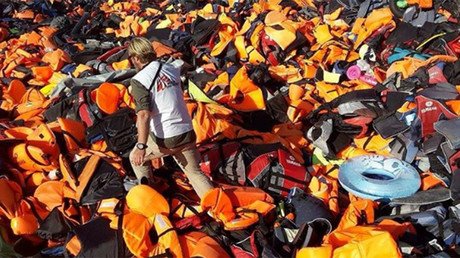Turkey hinted we’d never be allowed to visit refugee camps – Amnesty to RT
Turkey should make sure no refugees are mistreated; an Amnesty International spokesman told RT after it emerged a cleaner has been charged with raping children at a camp. Amnesty also called for Ankara to give the human rights group more access to camps.
The accounts given by children from the Nizip refugee camp are harrowing. Around 30 kids, some as young as eight, were allegedly raped by a 27-year-old Turkish man working as a janitor at the facility.
'He called me to the toilet': Leaked accounts of kids raped by employee at Turkish refugee camp https://t.co/NIKsOAl1sR
— RT (@RT_com) May 17, 2016
Andrew Gardner, a researcher from Amnesty International spoke to RT and said the Turkish authorities must take action not only against the man, but also to make sure there is no repeat in the future.
“If this is true, this is certainly a very concerning allegation and it needs to be investigated by the Turkish authorities,” he told RT. “But they need to take steps not to just investigate this case, but also make sure that there is no chance that this sort of occurrence can happen again in the future.”
The chain of abuse was horrific. The man who has only been named as ‘E.E.’ in leaked indictment papers – a native of the southeastern Turkish district of Bozova – has been charged with rape and faces 230 years in jail if he is found guilty.
“E.E. called me and took me to the toilet. He offered me 1.5 liras for sex. I refused. Then he abruptly removed my trousers and raped me,” a boy, identified only as ‘A.D.’, told the Turkish court, which is expected to make a ruling on the case on June 1.
Although there have been cases of refugees sexually abusing other migrants in camps, Gardner says the incident at the Nizip refugee camp is a new development.
“This is the first allegation I am aware of where a member of staff working at a camp has been accused of sexual abuse,” he told RT.
RT spoke to Erk Acarer, a journalist with the BirGun newspaper who accused the authorities of trying to cover-up the scandal by not letting independent journalists enter the refugee center.
“Our access to the camps was restricted from the very beginning and they only let pro-government journalists in and they don’t do that very often. Firstly they clear up the site and later lawmakers from the Republican People’s Party (CHP) somehow managed to get in and naturally they wanted to meet the families of the victims. But naturally, the authorities did not allow this,” Acarer said.
Gardner also painted a similar picture, saying the Turkish authorities have literally issued a blanket ban on allowing human rights organizations to visit refugee camps.
“At Amnesty International, we have made repeated requests for access to the refugee camps in Turkey and the Turkish authorities have repeatedly denied us access to the camps. The reason they give is to protect the security and privacy of refugees. They have also hinted that they will never give us permission to enter the camps,” Gardner told RT.
While the Amnesty researcher accepts the refugees have a right to privacy, he adds that “the ban on civil society organizations monitoring the camp in any meaningful way is not understandable, not legitimate and certainly that should change.
“What is happening in the camps is not open to the outside world. This is the sort of situation that can result in the sort of horrific abuses that we are seeing in this particular case, but also might result in a host of other problems as well,” Gardner noted.
Only eight children out of the 30 who suffered sexual abuse spoke out to the authorities about the ordeals they suffered at the hands of the serial rapist. Gardner believes there is a climate of fear amongst the migrants, who do not want to speak out in case their plight worsens.
“I think one of the problems with refugee camps in general is if your access to food and your access to education for your children is provided by the authorities, that does not give you a lot of autonomy. So the situation for people accommodated in camps is one of great dependence on the authorities,” he concluded.













